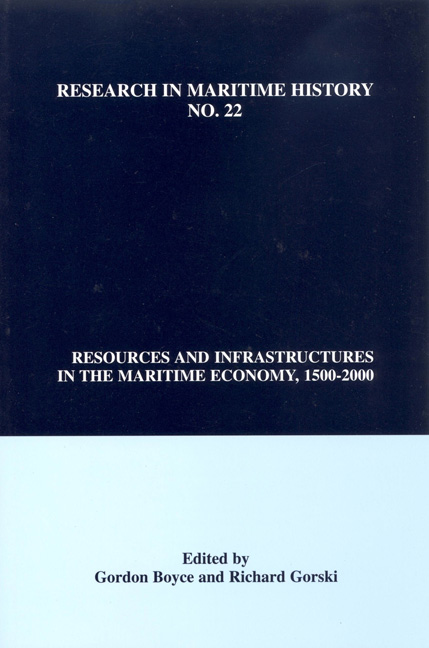Book contents
- Frontmatter
- Contents
- Contributors' Notes
- “Introduction: Resource Flows and Maritime Infrastructures”
- Part 1 Intangible Infrastructures and their Components
- “Ship Agents in the Twentieth Century”
- “Consular Services of the Nordic Countries during the Eighteenth and Nineteenth Centuries: Did They Really Work?”
- “The Narrow Sea Complex: A Hidden Dimension in Mediterranean Maritime History”
- Part 2 Resource Flows and Economic Development
- Part 3 Physical Infrastructures: Port Development and Planning
“Ship Agents in the Twentieth Century”
from Part 1 - Intangible Infrastructures and their Components
- Frontmatter
- Contents
- Contributors' Notes
- “Introduction: Resource Flows and Maritime Infrastructures”
- Part 1 Intangible Infrastructures and their Components
- “Ship Agents in the Twentieth Century”
- “Consular Services of the Nordic Countries during the Eighteenth and Nineteenth Centuries: Did They Really Work?”
- “The Narrow Sea Complex: A Hidden Dimension in Mediterranean Maritime History”
- Part 2 Resource Flows and Economic Development
- Part 3 Physical Infrastructures: Port Development and Planning
Summary
The histories of the Paul Günther firm and the Internationale Crediet- en Handels- Vereeniging “Rotterdam,” commonly known as “Internatio,” are instructive for thinking about the place and fate of ship agents in the twentieth century. The development of these two enterprises illuminates three themes: the varieties in the structures or kinds of ship agencies; the central role of ship agents in the maritime networks that moved people and goods around the world; and the alteration of that role and its business culture after decolonization and the container revolution.
Internatio was a Rotterdam-based trading company focussed on the Dutch East Indies (DEI). From its inception in 1863, it engaged in ship agency work. By 1878 the firm had won the Rotterdamsche Lloyd's (RL) East Indies’ account and would in effect direct that company's business in the East for the remainder of their combined time in Indië/Indonesia. For Internatio this was a considerable affair with complex commitments: clearing and dispatching RL ships, but also training the sons of the managing family; forwarding intelligence on routings, traffic and shipping; providing strategic advice; negotiating major business; and running RL's pilgrim business to Mecca. In the archives of the Rotterdamsche Lloyd can be found file after file of business trips Internatio men made for their principals in Rotterdam. Travelling throughout the archipelago, to East and Southeast Asia, they reported on agencies, scouted out rubber estates, canvassed for cargo and passengers, established contacts, called on companies whose employees might travel on leave, and made courtesy calls to important shippers.
Yet Internatio's main business was trading and managing, not shipping. It imported European goods and artificial fertilizers, and it exported important quantities of tropical commodities. It possessed its own sugar mills. It owned plantations and participated in, or was managing agent for, many more estates. After the First World War it began to invest in manufacturing in the DEI. Before the Second World War Internatio possessed, in addition to its headquarters in Rotterdam, seventeen branch offices throughout Java, Sumatra, Borneo and the Celebes, extending as well to Singapore, Thailand and Japan. At the end of 1939 total office personnel in the East (exclusive of estate and industry operatives) totalled 1347, of whom over two hundred had been sent from Europe.
- Type
- Chapter
- Information
- Publisher: Liverpool University PressPrint publication year: 2002



